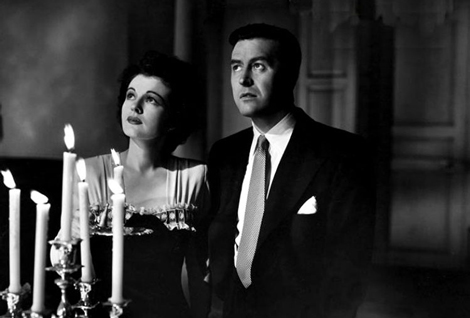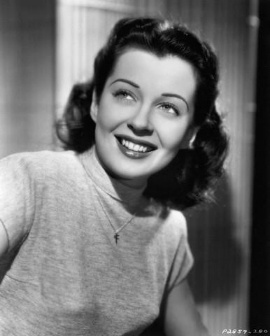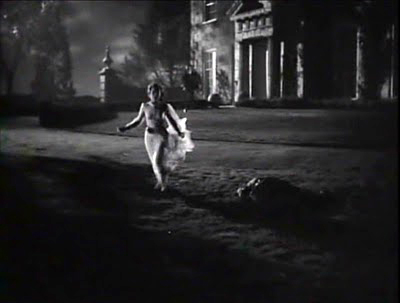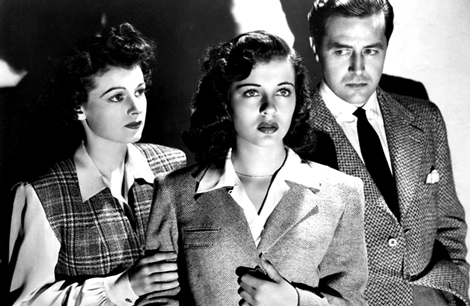|
|
Reviewed by Glenn Erickson
Truly good ghost story movies are not many in number. The best of them work more by suggestion and atmosphere than special effects or actual physical mayhem. This is perhaps why so many silent horror thrillers introduce the supernatural only to push it aside in favor of a rational explanation. The great The Haunting certainly delivers the goods, but it's actually a reaction to ghost story clichés that imagines a scientist of the paranormal investigating a so-called haunted house. That tack has been done many times over, using whatever new technology comes along. A great example is an English TV movie by Nigel Kneale called The Stone Tape. in typical Kneale fashion, researchers determine a semi-scientific explanation for a haunted castle.

Ghost stories of course vary, but the most frequent is the 'real estate problem', in which people discover that they've moved into a house with an active and sometimes malevolent spirit presence. Paramount's The Uninvited may be the most pleasing of all of these pictures. It's beautifully made and acted, and told so well that we can readily visualize the unseen, horrific past events. Stories of this kind are almost always best when delivered by the spoken word, and much of The Unseen consists of people explaining events from the past. Former stage director Lewis Allen finds a good serious tone for the show, with just enough humor to avoid total morbidity. The cast is excellent. The smooth Ray Milland creates real chemistry with the young Gail Russell (Angel and the Badman, The Night Has A Thousand Eyes).
On the Cornwall coast, adult siblings and Londoners Roderick and Pamela Fitzgerald (Ray Milland & Ruth Hussey) discover a beautiful cliff-side house for sale. Commander Beech (Donald Crisp) sells cheap but refuses to discuss the house's history. Pamela is soon disturbed by eerie sounds of crying at night; Rod tries to rationalize the noises but cannot. They also feel an overpowering chill when they enter a room that was once an artist's studio. The Commander's granddaughter Stella Meredith (Gail Russell) is very unhappy that the house is leaving the family, but is overjoyed when Rod and Pam invite her for dinner. The Commander forbids such a visit, but Stella goes anyway. Through Stella, the local doctor Scott (Alan Napier) and their maid Lizzie Flynn (Barbara Everest), the Fitzgeralds piece together the terrible story of Stella's mother Mary, her artist husband and a villainous Spanish woman named Carmen Quesada. Stella seems possessed by an evil spirit in the house, and a strong scent of mimosa signals Mary's presence. Rod is barely in time to keep her from throwing herself from the cliff. Meanwhile, the Commander alerts Miss Holloway, an intimidating woman who runs the "Mary Meredith Retreat", a rest home for mentally disturbed patients. Miss Holloway has a connection with the murderous events seventeen years before. She urges the Commander to immediately allow her to take Stella in her charge, before the girl's obsession can affect her mind. Rod, Pamela and Dr. Scott perform a séance, in an attempt to calm Stella down. To their surprise, their Ouija setup seems to confirm the very active presence of Mary Meredith!

Based on a book by Dorothy Mcardle, The Uninvited becomes more fascinating as it unspools. Casting is everything. With her dark, sad eyes, Gail Russell is sympathetic and vulnerable. Her emotions seem out in the open, which captivates the audience as well as the likeable Ray Milland. The supposed supernatural problem is really an interpersonal, psychological conflict. Commander Beech means well, but his inflexibility is doing Stella's no favors. Behind Beech is the menacing Miss Holloway, whose villainy may extend beyond simply wanting to lock Stella up.
The movie doesn't go in for grand effects or stylization for its supernatural events. We begin with a moody shot of the ocean rocks that claimed Mary Meredith's life, and some light comedy introduces us to the house -- which is such a beauty that nobody would want to pass it up, ghosts or not. Although this is 1937, the house appears to have no electricity, which cues a great deal of atmospheric corridor-wandering carrying candles. 1 Refreshingly, no frightening music, loud noises or frantic camerawork signals the presence of the ghosts; only their voices. Rod and Pamela stand at the top of the stairs as they try to discern the source of the sobbing voice, as if they were searching for a water drip. There must be a rational explanation...
Everything is expressed through the characters. Rod and Pam are concerned but too secure to be afraid of a disembodied voice per se. They instead see the effects of the haunting through Stella, who is drawn to the studio where her womanizing father painted her mother. The mimosa fragrance appears whenever she does. Stella is drawn, she thinks, to be with the lost mother she never knew, so it seems wrong that the phantom should want to frighten Stella upset or compel her to kill herself. Only when the whole story comes out is the tale of what happened between Mary, Carmen and Miss Holloway revealed. The Uninvited is that it is basically a therapeutic story, about the healing of an unhappy child. The attraction between Rod and Stella is put on hold, but we know that that resolution of the haunting will be the beginning of their happiness.

It's too easy to attribute the influence of Val Lewton to every psychologically based horror story of the 1940s. The Uninvited actually outdoes most of the dramatic movies of Hollywood's psychology fad. It also employs a fairly daring, if prejudicial, implied lesbian theme. All the clues (make that big flags) point to Miss Holloway's maladjustment. She listens to Tristan and Isolde in her office, where she's a harsh and controlling boss, as was the oppressive Miss Lowood in Lewton's The 7th Victim. Fanatically devoted to Mary Meredith, Miss Holloway played a big role in the dark events of 17 years earlier. Miss Holloway describes herself and Mary as fearless and independent, unafraid to make their own way in the World. A diary describes her as 'unnatural' because she feared having children - perhaps the idea is that she chose the "hollow way". It would be interesting to imagine an alternate Uninvited in which Miss Holloway is a persecuted innocent.
Happily, The Uninvited compensates by surprising us with its final verdict for the "evil, dark gypsy" Carmen Quesada. It's a very pleasing thing to see Stella Meredith reconciled with her mother and her haunted past. For that matter, things turn out well for almost everybody, even the Fitzgerald dog that we thought had been claimed by the haunted house.
The Uninvited could have kept its haunting on a psychological plane but opts instead for some effective and reasonably subtle ghost effects at the finish. Unlike the Hell Demon in Jacques Tourneur's Night/Curse of the Demon, I've not heard of these ghost visions offending anyone, even though director Lewis Allen was against them. The visual discretion of Allen and the Paramount effects department keeps us from thinking of The Uninvited as a "Topper" comedy.
Everybody loved The Uninvited when it was new; apparently an absorbing ghost story was a good diversion away from the war. James Agee's mini-review for The Nation mentions the film's many "little scares". He's right. Séance scenes are normally a good time to visit the restroom, but in this show every little move of the Ouija apparatus provides a solid jolt.

That's because we're heavily invested in the emotions of Stella, the Gail Russell character. The Uninvited is the source of the popular tune Stella by Starlight. Rod is a composer, and he writes it to express his affection for her. The song reportedly didn't become a hit until jazz musicians covered it after the war.
The Criterion Collection's Blu-ray of The Uninvited is a very good to excellent encoding of this Paramount Picture, which migrated to Universal/MCA with a huge library purchase in the 1950s. The elements are in great condition and Criterion's additional digital cleanup restores the original slick Paramount look. Charles Lang's B&W cinematography is spooky enough, but never forced.
Light on extras (and priced accordingly), the disc carries an effective original trailer, two radio adaptations and a highly recommended visual essay from Michael Almereyda. At first the featurette seems a bit scattered, especially when we're suddenly hearing too much about Ray Milland's movie The Ministry of Fear. But then Almereyda digs into the intriguing idea that all movies are ghost movies, because they show us shadows of dead people and dead things. Milland's interesting career story dovetails into the tragedy of Gail Russell, the teenager recruited from Santa Monica High, who never felt secure as an actress. She's so good in the movie that this story seems unlikely; then we hear the sad details of her problems with alcoholism, and John Wayne's attempt to help her re-start her career. Almereyda replays a scene from the movie in which Stella Meredith is supposed to be light-hearted and happy -- but we can see her hand clutching her bag as if holding on for dear life.
The insert booklet offers an essay by Farran Smith Nehme and an informative vintage interview with the generally unheralded director Lewis Allen, conducted by genre expert Tom Weaver. Criterion's cover artwork by Sam Weber is really great, a big improvement on original posters. Just when are we going to be able to purchase Criterion poster art, anyway?
On a scale of Excellent, Good, Fair, and Poor,
The Uninvited Blu-ray rates:
Movie: Excellent
Video: Excellent
Sound: Excellent
Supplements: Trailer, radio adaptations, visual essay by Michael Almereyda
Deaf and Hearing-impaired Friendly?
YES; Subtitles: English
Packaging: Keep case
Reviewed: October 28, 2013
Footnote:
1. We get the idea that everybody in the haunted house carries candles at night because the house has no electricity. Yet later on, Rod is seen listening to an ordinary bedside radio. Did I miss an explanatory line about this? My wife tells me that people in places where electricity wasn't a given, often had battery powered radios. Is that the answer?
Return

DVD Savant Text © Copyright 2013 Glenn Erickson
See more exclusive reviews on the Savant Main Page.
Reviews on the Savant main site have additional credits information and are often updated and annotated with reader input and graphics.
Also, don't forget the
2011 Savant Wish List.
T'was Ever Thus.
Return to Top of Page
|

